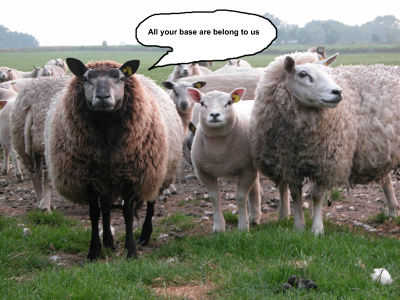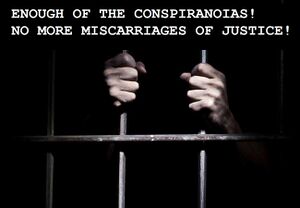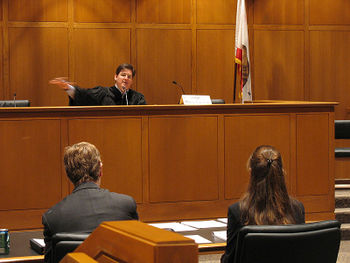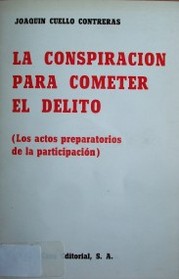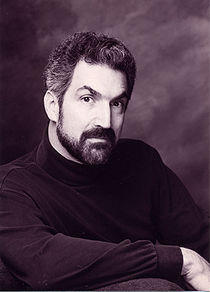Conspiranoid
“Let us never tolerate outrageous conspiracy theories”
“Let us never tolerate outrageous conspiracy theories”
“Let us never tolerate outrageous conspiracy theories”
“Let us never tolerate outrageous conspiracy theories”
“Let us never tolerate outrageous conspiracy theories”
“Do strange things happen in Auschwitz? Come on, don't be a conspiranoid. Tomorrow we are both going by train there and you will see that there is nothing special there. Don't you plan to come? How conspiranoid you are!”
ATTENTION: If you read this article you will be challenging the premises of public life in the United States and Daniel Pipes will be very angry with you. Be warned.
Conspiranoid (from English conspiracy and paranoid), is a person who has the ridiculous and absurd belief that a government can lie or that a group of people or an organization can conspire to do something bad or criminal.
This is absurd. It is well known that there are no conspiracies. Quite the contrary, governments are always very good and never lie or commit fraud or conspire. Since conspiracies do not exist, all those who have been convicted by the Courts of conspiracy have been victims of a miscarriage of justice.
As is well known, governments, companies, organizations, etc... only know how to organize and plan good things. For some strange reason, they can never or have no interest in organizing or planning bad or criminal things.
It can be demonstrated that there are no conspiracies with the following unquestionable arguments: Oh, how funny, of course, the CIA!... Elvis... the moon... paranoia... Occam's Razor.... If somebody, despite these very convincing arguments, continues to believe in some conspiracy, is that he is completely crazy.
But if conspiracies existed, which they do not exist, what would be called someone who believed in fewer conspiracies than they actually are? hypoconspiranoid? hypoconspiracist? anti-conspiracist? paranoid of non-conspiracy?
Furthermore, if there have ever been conspiracies in history, from now on, no more will be discovered.
For centuries, courts have convicted people of conspiracy. But since the word "conspiranoia" was invented, conspiracies no longer exist! Excellent! It was great to find such an invention to avoid so much suffering. It would be good to invent the word "torturanoia" so that torture would cease to exist. We should also invent the word "murdernoia" and there would be no more murders.
Conspiracy theories often involve societies such as the CIA, the KGB, Freemasonry, the Inquisition and other societies, which, skeptics say, never do anything (so what are they for?).
Examples of conspiracy theories: Is Walt Disney cryogenized? Does Hitler live in some secret place in the Río de la Plata? Do your parents know that you hide porn magazines under your bed? Does your country's Intelligence Agency know that you are visiting this article? Did the CIA promote Pinochet's coup d'état in Chile? Do rebellions exist? And the wars? Can't Subcomandante Marcos stop? (...the hair, I mean the hair and I say it because of the hood that he always wears) Does the CIA do anything or do its employees only do crossword puzzles during work hours? Typically, they are carried out by a group of powerful people, such as Bill Gates or Stephen King or organizations such as the CIA, KGB, Freemasonry, etc...
When a government distrusts its citizens, it is prudence. When a citizen distrusts the government, it is conspiranoia. When a government distrusts another government, what is that?
Conspiracies in History[edit | edit source]
See also: List of the most important conspiranoias.
The following facts are conspiracies:
- All wars.
- All rebellions.
- All terrorist acts.
As it is well known that conspiracies do not exist, all of the above events neither exist nor have ever existed. If you see images about wars, rebellions or terrorism on television, it is either a hallucination or a Photoshop montage. If you believe you have witnessed or experienced an act of terrorism, then you have suffered a hallucination.
Frauds by companies to defraud the Treasury are also conspiracies. As the Tax Inspectors try to prevent said frauds, it turns out that they are all conspiranoids. And since conspiracies do not exist, when they discover a fraud it is because they have suffered a hallucination.
Extension of the conspiranoia[edit | edit source]
Conspiracy is provided for and punished in the criminal legislation of all countries.
Therefore, the following people are conspiranoids:
- The legislators of the countries whose criminal legislation includes the figure of conspiracy. This poor people don't know that conspiracies don't exist.
- Criminal Law professors who say that conspiracies exist and explain what they consist of.
- Prosecutors accusing someone of conspiracy.
- Judges who convict someone of conspiracy. Since conspiracies do not exist, all those convicted of conspiracy have been victims of a miscarriage of justice!
- Defence lawyers who strive to demonstrate that this specific conspiracy did not exist or that their client did not participate in it. What they should have done is claim that conspiracies, in general, do not exist.
- Historians, who talk about historical events such as The Southampton Plot, The Amboise Plot, The Gunpowder Plot, etc. Historians are conspiranoids. Have they not realized that conspiracies do not exist? Furthermore, historians believe that Elvis is alive. Maybe it is not true that they believe it, but this phrase is used by tradition.
Psychology of conspiranoia[edit | edit source]
In a world that has known the Holocaust, Stalin's purges, the Katyn massacre, the Paracuellos massacres, the murder of Trotsky, Operation Gladio, the missing people of the National Reorganization Process in Argentina, the MKULTRA, the Watergate scandal, the GAL, the Iran-Contra Affair and the ECHELON network, among other things, it takes a fool and an idiot to distrust a government or a government agency, such as the CIA, for example.
Distrusting governments might be reasonable if they had ever done something wrong. But since that is not the case, believing in conspiracies is absurd and ridiculous. It's the difference between rationality and stupidity.
In a world with dangers, we must know how to distinguish between rational fears and crazy fears. For example, being afraid of Al-Qaeda is a reasonable fear. On the other hand, being afraid of the CIA is a foolish and paranoid fear. Although Chileans don't really agree with that. Fortunately, we have some wonderful, very good politicians who never lie and who tell us which fears are reasonable and which are not. Always trust politicians and they will never let you down. Always trust politicians and you will never suffer from paranoia.
Distrusting governments is a mental illness. On the other hand, total, unconditional and absolute trust in governments is never pathological. Furthermore, it is the only guarantee of mental health.
That governments and government agencies, such as the CIA, are very good and never do anything wrong is obvious to any sane person. But conspiranoids start from a completely absurd assumption. They think something like: "Sometimes, it might happen that a government or a government agency plans something bad." When such absurdity is thought, the most ridiculous theories, the most insane theories, the greatest aberrations, the greatest madnesses arise.
Conspiranoia has been the subject of study by various psychologists. Thus, for example, an article in the British Journal of Social Psychology published in 2011 says:
“We advance a new account of why people endorse conspiracy theories, arguing that individuals use the social-cognitive tool of projection when making social judgments about others. In two studies, we found that individuals were more likely to endorse conspiracy theories if they thought they would be willing, personally, to participate in the alleged conspiracies. Study 1 established an association between conspiracy beliefs and personal willingness to conspire, that fully mediated a relationship between Machiavellianism and conspiracy beliefs.”
Such an amazing thing! What a surprise! Now it turns out that there are Machiavellian people! Now, although there are Machiavellian people, governments and employees of government agencies, such as the CIA, are never Machiavellian. And among the people with a "personal disposition to conspire", there are never politicians, who are all very good and never conspire.
In the Soviet Union, they were the first to realize that conspiranoia (that is, distrust of governments) is a mental illness:
“The starting point for those “treatments” was very clear: any thought or attitude that deviated from the revolutionary norm was an unequivocal symptom of mental imbalance. Nikita Khrushchev himself declared in 1959: “Of those who oppose communism, we can clearly say that their mental state is not normal.” (…) In 1969, Yuri Andropov, (…) published a decree on Measures to prevent dangerous behavior by people with mental illnesses.”
In the Soviet Union, they were pioneers in putting an artificial satellite into orbit, Sputnik 1. They were also pioneers in putting a living being in space, the dog Laika. They were also pioneers in putting a man in space, Yuri Gagarin. And they were also pioneers in realizing that conspiranoia (that is, distrusting governments) is a mental illness.
Organizations involved in conspiracy theories[edit | edit source]
In most conspiracy theories, a series of organizations are involved, such as the CIA, the KGB, Freemasonry, the Bilderberg Group, the Inquisition, etc. One question, if these organizations have never carried out conspiracies, what are they or were they dedicated to? Because presumably they have done something at some point, right?
One of the organizations that appears most frequently in conspiracy theories is the CIA. This organization is very good and has never organized anything bad or criminal. Well... ahem... maybe the CIA sometimes did something bad. But from now on, nothing bad done by the CIA will be discovered. And if later something else is discovered again, they will say again: "but from now on, nothing more." And so on, forever and ever.
The conspiranoid historian Michael Parenti has used the term "conspiracy phobia". As said before, historians are all conspiranoids who believe that Elvis is alive. This historian calls the CIA "an institutionalized conspiracy".[1] This author does not realize that, although the CIA has done some bad things before, very few, from now on, it will never do anything bad again.
The acronym CIA means precisely "Conspiracy Institutionalized Advanced".
Refutation of conspiracy theories[edit | edit source]
To refute conspiracy theories, the following means can be used:
- One way to refute them would be to use rational arguments about the possible existence or not of a specific conspiracy. This, however, has a series of drawbacks: a) reasoning is very tiring, b) also all conspiracy theories must be examined one by one. Furthermore, some skeptics are averse to using reasoning.
That is why it is better to use the following methods:
- Make fun and sarcasm about the theory. Learn to say: "Oh, how funny! The CIA!" Practice until you get the right tone of voice.
- Whether it's relevant or not, mention Occam's Razor and say that, according to her, the conspiracy theory is false.
- Make a list of the most ridiculous conspiracy theories and compare them to the conspiracy theories you want to disprove.
- Assume, even if it is a lie, that anyone who believes in one conspiracy theory also believes in all other conspiracy theories.
- Of course, never forget to mention the theory that Elvis is alive, even if it has no similarity to the conspiracy theory you want to disprove.
- Say that everyone who believes in the conspiracy theory is crazy. Say it, even if it turns out that 80% of the population is crazy and psychiatrists haven't diagnosed it.
- Of course, you should never mention conspiracy theories that have turned out to be true.
- If someone mentions a conspiracy that actually occurred, deny that it was a conspiracy. If you can change the meaning of words with enough skill, you have a lot to gain. Remember the following two principles:
- If it is a conspiracy, it has not happened.
- If it has happened, it is not a conspiracy.
- If you know how to properly handle these two principles, you will be able to triumph in controversies.
- Never mention the legal meaning of the word "conspiracy". It is already known that legislators, criminal law professors, judges, prosecutors and lawyers are all conspiranoids.
- In the worst case scenario, you should say:
"I banged a Luis""But I have never said that conspiracies do not exist."
Fallacies[edit | edit source]
To refute conspiracy theories the following fallacies are often used:
1st Fallacy of appealing to ridicule. Continuously saying: "Crazy conspiranoid... Conspiracy nut... Oh, what a laugh, of course, the CIA!... Elvis... the moon... paranoia... Occam's Razor..."
2nd Ad hominem fallacy. For example: "Those who promote this conspiracy theory only want to make a business selling books and T-shirts."
3rd Fallacy of ambiguity, equivocation or amphibology. It occurs when a term with more than one meaning is used in the same argument. For example:
- The theory of the controlled demolition of the Twin Towers is a conspiracy theory (meaning 1).
- By definition, conspiracy theories (meaning 2) are false.
- Therefore, the theory of the controlled demolition of the Twin Towers is false.
4th Fallacy of authority. That is, trusting authority unconditionally. In this case, the authority is the rulers or government agencies or both. Consequently, the official version that they support is considered true and the conspiracy theory that questions said official version is rejected.
5th Association fallacy. The most ridiculous conspiracy theories are selected and mentioned continuously. One of the most mentioned is the theory that Elvis Presley is alive. As for the conspiracy theories that have turned out to be true, they are not mentioned or are not acknowledged to have been conspiracy theories. It is then concluded or implied that all conspiracy theories are ridiculous. An example of this is the numerous web pages on something like "top ten conspiracy theories". These web pages imply something like: "Have you seen how ridiculous conspiracy theories are?" Although what really happens is: "Have you seen how ridiculous the conspiracy theories that I have selected are (I have selected them precisely for that reason)?" (Obviously, conspiracy theories that have turned out to be true are not mentioned there.) Logically, conspiracy theories that have characteristic A (whatever that is) have characteristic A.
6th Reductio ad Hitlerum. For example: "Adolf Hitler believed in conspiracy theories." Logical, because everyone believes in conspiracy theories, be it this theory or that one. Evidently, conspiracy theories that were official conspiracy theories in Nazi Germany were not official conspiracy theories in the United States. Furthermore, Hitler was a conspiranoid because conspiracy was foreseen and punished in the criminal laws of Nazi Germany. But that also happens in other countries. In all countries, criminal laws provide for and punish conspiracy. How much conspiranoid there is in the world!
7th Ad baculum fallacy. Fallacy that supports an argument based on force or threat. For example: "If you spread this conspiracy theory, we will fire you from your job."
8th Fallacy of begging the question. Starting from the assumption (explicit or implicit) that conspiracy theories are false, it is implied or concluded that conspiracy theories are false.
9th "No True Scotsman" fallacy. "No conspiracy theory turns out to be true." "The conspiracy theory of Richard Nixon's guilt in the Watergate scandal turned out to be true." "The theory of Nixon's guilt in that affair was not truly a conspiracy theory." That is, when a conspiracy theory turns out to be true, it is not recognized that it was a conspiracy theory.
10th Fallacy of trivial tautology. This fallacy occurs when a trivial tautology is presented as if it provided some additional information, which it evidently does not do. Trivial tautologies are always true. What constitutes a fallacy is to pretend that they provide any additional information. (Often, this fallacy, explicit or implicit, is used as preparation for the fallacy of ambiguity [3rd] or for the fallacy of "No True Scotsman." [9th])
"Conspiracy theory" is defined to include (explicitly or implicitly) the fact that it is false. So, the phrase "Conspiracy theories are always false." is just a trivial tautology. A trivial tautology that provides no additional information. A trivial tautology that proves nothing. A trivial tautology that only produces confusion. A trivial tautology that provides no help in rationally evaluating any particular belief. Indeed, to prove that a given belief is a conspiracy theory, one would first have to prove that it is false. But once it has been proven false, the tautological concept of "conspiracy theory" has been superfluous and has not helped at all.
Of course, it would be possible to do the reverse tautology. Define "conspiracy theory" including the fact that it is true. So, the phrase "Conspiracy theories are always true." would also be a trivial tautology and would not help at all to rationally evaluate any given belief.
The business of conspiracy theories[edit | edit source]
According to somebody, conspiracy theories are a business for those who promote them by selling books. Of course, those who write books or give lectures against conspiracy theories do it free, don't they?
As crazy bootlickeranoids rightly say, there are no conspiracies. The obvious conclusion is that the people who have been convicted by the Courts of conspiracy have been victims of a miscarriage of justice. And therein lies another business of conspiracy theories. It is precisely this business that explains the rise of conspiracy theories and why so many nuts (professors of Criminal Law, judges, prosecutors, etc.) say that conspiracies exist (of which, by the way, they have made their livelihood).
When the conspiracy theory business gets going, the evil conspiranoids who profit from it don't care about harming innocent people. To maintain this business, legislators in many countries include the figure of conspiracy in their criminal codes. With this they begin this lucrative and immoral business. Criminal Law professors lie saying that conspiracies exist and explain to their students what they consist of. These professors even write Criminal Law books talking about conspiracy. Books that, with their sale, represent an income for them. Others who profit from conspiracy theories are, therefore, publishers and booksellers, especially if they specialize in Law. In their greed, they are not worried about lying or defrauding or harming innocent people. We could call the law faculties of universities "schools of conspiracy nuts."
The polices often accuse people of conspiracy and bring them to justice. Prosecutors accuse many people of conspiracy. The judges have convicted many people of conspiracy. The thing doesn't end there. After sentencing, prisons officials are responsible for the custody of people wrongfully convicted of conspiracy.
There are no conspiracies. Since conspiracies do not exist, all those who have been convicted by the Courts of conspiracy have been victims of a miscarriage of justice. But there are many people who profit from this conspiranoia business: legislators, professors of Criminal Law, booksellers, prosecutors, judges, police, prison officials, librarians of Wikipedia, etc. It is not strange, therefore, that conspiracy theories arise that in many cases end in the conviction of an innocent person. Because all of those people mentioned above have made conspiracy theories their livelihood.
Furthermore, all these conspiranoid (legislators, criminal law professors, prosecutors, judges, police officers, etc.) believe that Elvis is alive.
Dangers of conspiranoia for society[edit | edit source]
Therefore, conspiranoids are a threat to society. The conspiranoids (especially the judges, who are the worst conspiranoids of all) are evil who try to make us believe that conspiracies exist (which is lie). That is, the conspiranoids have formed a conspiracy to spread conspiracy theories. And this conspiracy of conspiranoids also does not exist. Or it does exist? As the crazy bootlickeranoid Daniel Pipes says:
“What if these disparate elements shared beliefs, joined forces, won a much larger audience, broke out of their intellectual and political ghetto, and became capable of challenging the premises of public life in the United States? This is the frightening prospect, soberly presented by Michael Barkun in his important, just-published book, "A Culture of Conspiracy: Apocalyptic Visions in Contemporary America" (University of California Press, $24.95).[2]”
That is to say, there is a very dangerous conspiracy of conspiranoids who try to deceive everyone by saying that conspiracies exist. And this conspiracy is extraordinarily dangerous. But if conspiranoids conspire to make us believe that conspiracies exist, then there is at least one conspiracy. In the case of the judges (the most dangerous conspiranoids of all) this conspiranoia in many cases it produces the conviction of innocent people.
Furthermore, as Daniel Pipes says, if you believe in conspiracies, you will not only challenge the premises of public life in the United States, but your hair will fall out, your spinal cord will dry up, and so on. More or less what the priests said would happen to you if you masturbated. Furthermore, challenging the premises of public life in the United States is rude. Even worse than reading the Uncyclopedia
Well, the conspiracy to challenge the premises of public life in the United States is a very dangerous conspiracy. We must be vigilant and alert against it. The conspiracy of conspiranoids is the worst (or the only one?) of conspiracies. And on top of that, it feeds the judges, prosecutors, criminal law professors, etc.
As if that were not enough, Fu Manchu, in his conspiracy to challenge the premises of public life in the United States (someone explain to me what that means), has financed a conspiranoid newspaper. Can there be anything more tremendous than the conspiracy of conspiranoids?
NOTE: Uncyclopedia readers are strictly prohibited from challenging the premises of public life in the United States.
References[edit | edit source]
- ↑ «At the same time, the CIA is an institution, a structural part of the national security state. In sum the agency is an institutionalized conspiracy». Parenti, Michael (1996): Dirty Truths. «The JFK Assassination II: Conspiracy Phobia on the Left», pp. 186.
- ↑ "[Michael Barkun on] Old Conspiracies, New Beliefs" :: Daniel Pipes
See also[edit | edit source]
- Conspiracy theorist
- Conspiracy theory
- List of the most important conspiranoias
- John F. Kennedy
- Central Intelligence Agency (CIA)
- The Catcher in the Rye
- World Trade Center
- Florida's election
- Bootlickeranoid
- Occam's Razor (You should talk about it, though is got nothing to do)
- Elvis Presley (You should talk about him, though is got nothing to do)
